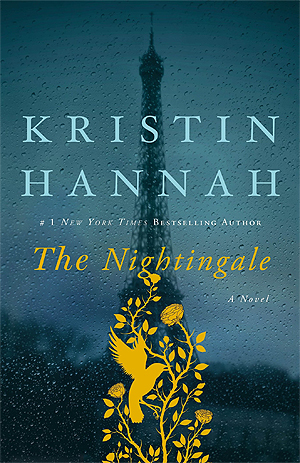Review: Kristin Hannah’s “The Nightingale”
by Miles Raymer
“If I have learned anything in this long life of mine, it is this: In love we find out who we want to be; in war we find out who we are.” (1)
So begins Kristin Hannah’s The Nightingale, which gripped me from the opening sentence and didn’t let go until I tore through the final pages. It is the tale of two sisters, Vianne and Isabelle, struggling to survive in Nazi-occupied France during World War II. Vianne and Isabelle’s relationship is strained due to a difficult upbringing, but the pressures of Nazi domination push them even further apart. What follows is a poignant and harrowing investigation into the traumas of war, especially as experienced by women.
While The Nightingale reads in many ways like a typical piece of historical fiction, there is one narrative device that makes it stand out. The story opens on the Oregon Coast in 1995, and is told in the first-person by one of the sisters, now grown old and nearing the end of her life. As the narrator starts to recount her life during the war, Hannah switches to the third-person, making it impossible to tell if the narrator is Vianne or Isabelle. This imbues the book with a powerful urgency, making the reader desperate to discover what befell the two sisters and which one presumably didn’t make it. I wouldn’t go so far as to call this a demonstration of creative genius, but it’s damned good storytelling.
As the French occupation becomes increasingly brutal, Vianne and Isabelle develop different strategies for coping in wartime. Vianne, a small-town mother whose husband was captured and imprisoned in the war’s early stages, resolves to dig in and wait things out as best she can. Isabelle, more impetuous and without children, joins the French resistance and actively undermines Nazi authority. Each path has its particular dangers and benefits––a contrast Hannah develops nicely.
Hannah doesn’t shy away from the reality of Nazi atrocities, but neither does she portray all Nazis as mindless monsters. One of the supporting characters is a Wehrmacht Captain named Beck, who billets at Vianne’s house during the occupation. Forced into an extremely awkward domesticity, Beck and Vianne develop a nuanced relationship––a combination of mutual respect, wariness, and unwanted but unmistakable attraction. Beck’s presence adds a strong layer of ethical complexity to The Nightingale, reminding us that the tragic nature of war flows from its ability to make good people do bad things.
At its core, The Nightingale is a celebration of how femininity fights and endures. Vianne and Isabelle show us that acts of heroism happen in kitchens and bookshops as much as in war rooms and on battlefields. Both sisters find their courage, arriving at similar destinations via divergent routes that incite new confrontations, understandings and affections between them. Hannah cranks up the intensity in the last hundred pages, artfully knitting various plot threads together into a thrilling, heart-wrenching climax that left me weeping.
Love. It was the beginning and end of everything, the foundation and the ceiling and the air in between. (551, emphasis hers)
Is this sappy? Yes. Is it true? Definitely not. Did it make me feel amazing? Absolutely.
Rating: 10/10

Wow! Sounds like a really interesting read. I look forward to reading this someday.
Yes, I hope you do read it at some point!
Thanks for bringing this book to my attention Myles. It deeply affected me also.
Glad to hear it and thanks for reading! 🙂
There is an error here. The book begins in the first chapter in first person as a narrative. Then it switches to Third Person Limited Multiple POV.
This review calls it Third Person Omniscient. The POV characters are clearly limited to what they can see or learn. We are limited to what the POV characters can see or learn but for small expository pieces on history for clarity.
Hi Michael. I appreciate your attention to detail here. I should point out that I did not use the term “third-person omniscient” in the review. I merely called it “third-person,” which is technically correct. But you’re right that it would have been more accurate to call it “third-person limited multiple.”